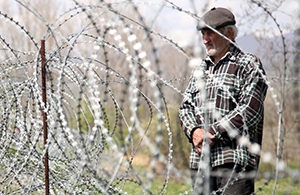Lado Bitchashvili, Shida Kartli
The life of Data Vanishvili, 84, has complicated after his house turned up in the occupied territory of Khurvaleti village. His life in the occupied territory of Georgia, which is separated from the rest of the Georgian territory with barbed wires, has become very difficult. Regardless many offers of the occupation forces, he did not leave the Georgian citizen and refused to get the Russian pension which is twice more than the Georgian pension. Despite difficulties, he never thought to abandon his house but his life in the occupied territory is getting more and more unbearable. The biggest problem is his access to healthcare and medicines.
“My wife is sick and I am not allowed to take her to the Gori hospital. They tell me to take her to Akhalgori or to Tskhinvali; but how can I take her there - on my neck?” Data Vanishvili worries.
He has not yet started spring agricultural works because he is old and cannot cultivate land without machines. He does not know how to use the so-called “hand tractor” which the former president of Georgia Giorgi Margvelashvili gave him as a present.
“We are alone with my wife; I wanted to cultivate the land with the tractor but I do not know how to start it;” Data Vanishvili told humanrights.ge.
He often tells about his problems with the representatives of the Government of Georgia and international diplomats, who arrive in Khurvaleti village. On April 15, permanent representatives of the countries in the UN met him when visiting the Khurvaleti village; they approached the barbed wires and Data Vanishvili was standing on the other side of the occupation line.
The diplomats learned about grave humanitarian and social problems of the residents of the ABL villages from Data Vanishvili and Kakha Imnadze, permanent representative of Georgia in the UN.
“They are those ambassadors, who do not have embassies in Georgia and neither we have embassies in their countries. The purpose of their visit is to see Georgia and learn about our successes, about the fields where we can cooperate and also about the problems which we have like the occupied territories and grave human rights situation in those territories.
Of course, de-occupation is the main message of our talks. Although we permanently disseminate information about this problem, it is very important that the ambassadors saw it personally,” Kakha Imnadze said.
According to the Ministry of Foreign Ministry of Georgia, permanent representatives of Finland, Senegal, Dominican Republic, Marshall Islands, Eswatini Kingdom and Federal States of Micronesia in the UN arrived in Georgia on April 14 and will stay in the country until April 21. They had meetings with the Deputy Minister of Foreign Affairs Lasha Darsalia, who provided them with the information about the situation in the occupied territories. The Ambassadors met the EUMM representatives and visited the IDP settlement in Tserovani. They also met senior officials of the Government – the President, the Prime Minister, the Chairman of the Parliament and the Minister of Foreign Affairs.
News
December 13, 2023
Ethnic minorities outside the peace dialogue
November 6, 2023
‘Peace’ agenda of political parties
Popular
Articles
February 13, 2024




